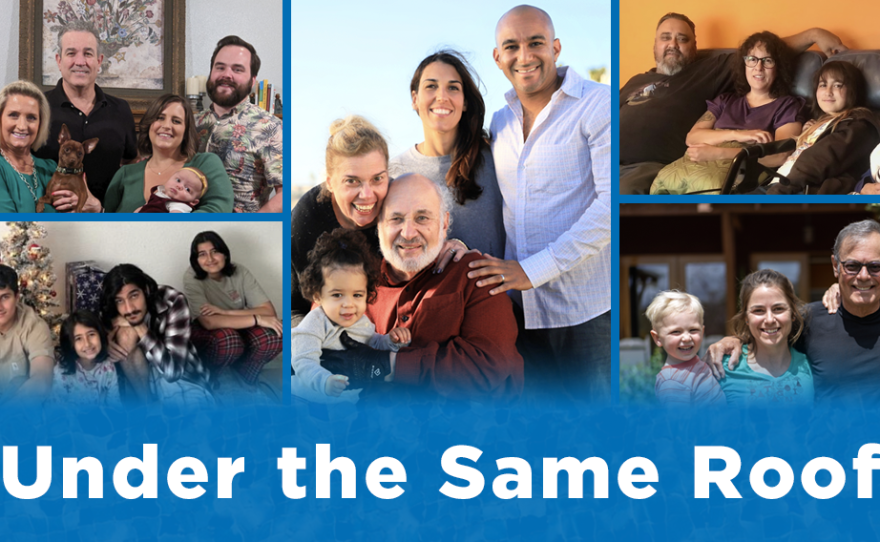The Giday household buzzed as they finished prepping an early dinner on a recent Thursday evening.
Bana, 33, roasted coffee over the stove, the pale green beans turning a deep brown until they released an earthy aroma. Her 10-year-old daughter Honey stood by her side grating ginger. The family matriarch Grace, 53, watched with pride, occasionally offering instructions in English and Tigrinya, her first language.
Space is tight in their two-bedroom apartment in City Heights. But the Eritrean family makes it work.
“I’m happy I live with my family again,” Grace said. “Because my family, that’s all I have.”
They filled their plates and sat down on the couch to eat. The meal — inspired by northeastern African cuisine — included chicken in a spicy stew, purple cabbage, and injera, a spongy flatbread. Bana poured the coffee steeped with ginger into little ceramic cups.
The Giday family is one of many in the San Diego region residing in a multigenerational household, which means three or more generations under the same roof. According to U.S. Census data, more than 10% of the region’s residents live in multigenerational homes — sometimes by choice, sometimes out of necessity.
It’s a little bit of both for the Giday family. This two-bedroom apartment is all they can afford, even with government assistance. But they also believe living together has strengthened their bond as a family after years of hardship. Their story is a winding journey through homelessness, incarceration, addiction and threats of deportation — culminating in sobriety, faith and family unity.
Grace’s family is originally from Eritrea, a small country in northeastern Africa. They moved to Sudan shortly before Grace was born due to an ongoing war in their home country.
Her village was poverty-stricken, and local terrorist groups made it dangerous for girls and young women.
“We didn’t have no lights, electric(ity),” she said. The village had a school, “but our parents were scared to send us because (the terrorist groups were) going to kill us, kidnap us.”

Grace came to the U.S. at age 16 with her husband and their daughter Bana, who was one. The couple had a son in the U.S., but the marriage soon crumbled.
That left Grace lost in this new, unfamiliar place.
“In this country I didn’t have any family at all — nothing, nothing,” she said.
Grace started drinking heavily, searching for community and comfort in the wrong places, with the wrong crowd.
“I didn’t care anymore,” she said. “Because at that time I miss my family. I wanted to kill my pain.”
It came at a cost. She got a DUI. Child protective services took her children. Grace buried the pain with more drinking. Eventually, she wound up living on the streets.
Another DUI landed her in jail and facing deportation. A government lawyer pushed for her expulsion from the U.S.
“The judge said, ‘I’m giving her a chance,’” Grace recalled.
The judge believed she could get clean and straighten out her life. But another mistake would mean being deported — and possibly never seeing her children again.
“After then, I never drink for 12 years — never drink, never smoke marijuana, never do anything,” Grace said.
Around that time, Bana found herself on her own path to recovery.
She had a turbulent upbringing in the foster care system. She dropped out of high school and then — like her mom — found herself on the streets, struggling with addiction.
That all changed when she got pregnant with her daughter Honey.
“I got back on my feet again after my daughter,” Bana said. “From being homeless, from being on the street.”
Bana moved into supportive housing. She reconnected with Grace, who wanted to help provide a better life for her granddaughter.
Grace and Bana bonded over a newfound devotion to God, and a shared commitment to staying sober.
The family landed an apartment in an affordable housing complex in City Heights — a coveted spot, considering the scarcity of affordable housing in the region.

Honey is now heading into the fifth grade. As she talked about school, her magenta braids bobbed up and down and she bounced in place on the couch.
“My favorite subject is — art is my first one,” she said. “And math. And playing with my friends in school. And recess.”
And the best part about living with her mom and grandma?
“They’re kind, and they make problems go away,” Honey said, which prompted laughter from Bana and Grace.
With stability in the family, Grace has focused on helping others in need, especially people living on the streets. She collects donations, anything from adult diapers to bottled water, and she hands out home-cooked meals — served with a side of wisdom from the Gospel.
She posts videos of her outreach work to her YouTube channel.
Bana has stayed busy with classes, making progress toward her high school equivalency degree. She hopes it will one day lead to a job working with children.
Eventually, she would like to find a bigger place for the family.
“Maybe a four- or five-bedroom apartment, something bigger, spacious,” she said.
She knows it’ll be tough, with runaway housing costs in San Diego. But Bana isn’t worried. She believes the family — all three generations — will live together for a long time. And that wherever they end up, it’s not the number of rooms that define a home — it’s the people who share the space.







